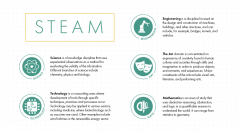
Investigating & Advancing Gendered Design in Lower-and-Middle-Income Countries (LMIC) in STEAM
Carleton University awards 20 grants, funded by the International Development Research Centre (IDRC), across the global south to support Gendered Design in STEAM.
The 20 selected research teams come from Africa, Asia & Latin America. The teams work in a variety of fields that practice design processes, but they share a common goal: to identify & overcome gender bias & tackle issues especially affecting women in Lower-and-Middle-Income Countries (LMIC).
Scholars in humanities, social sciences& and design are actively transforming the traditional science, technology, engineering & mathematics (STEM) fields into something with a more human-centred approach, taking STEM to STEAM by including the arts.
Driven by local interests, the awarded projects go beyond the common focus of gender innovations in health & agriculture by supporting advances in the fields of STEAM related to the following six sectors:
Infrastructure is the physical systems of a business, region, or nation. For instance, transportation systems, communication networks, sewage, water, and electric systems are all examples of infrastructure.
The manufacturing sector engages in the mechanical, physical, or chemical transformation of materials, substances, or components into new products. It is most commonly applied to industrial design, in which raw materials are transformed into finished goods on a large scale. Examples of manufactured goods include aircraft parts, household appliances and handicrafts.
Built environment & housing encompasses places and spaces created or modified by people to serve their needs for accommodation, organization, and representation. It covers architecture, landscaping, housing, public space, and access to resources, such as proximity to grocery stores.
Transport & mobility deals with the movement of people and products locally as well as internationally. It links people to jobs, delivers products to consumers, and connects regions and communities to each other and to international markets. It serves and attracts domestic and international trade. Examples include railroads, shipping, and public transport.
 Accessibility refers to the design of products, services, and/or environments so it is usable and accessible for people with disabilities and those who face, for example, financial or class barriers. Examples can include assistive technologies on websites, street design for wheelchair users and improving access to services that are usually unattainable in current systems.
Accessibility refers to the design of products, services, and/or environments so it is usable and accessible for people with disabilities and those who face, for example, financial or class barriers. Examples can include assistive technologies on websites, street design for wheelchair users and improving access to services that are usually unattainable in current systems.
The renewable energy sector is focused on deriving energy from natural processes that are replenished at a rate that is equal to, or faster than, the rate at which they are consumed. There are various forms of renewable energy, including wind energy, solar, and hydropower.
The GDS program is supported by an interdisciplinary collection of experts based at Carleton University (Ottawa, Canada), in collaboration with regional experts:
Project Implementation Team
Bjarki Hallgrimsson | Primary Investigator GDS Program, Associate Professor, Industrial Design, Carleton University
Dominique Marshall | Primary Investigator GDS Program, Professor, History, Carleton University
Chiara Del Gaudio | Investigator GDS Program, Assistant Professor, Industrial Design, Carleton University
Kerry Grace | Program Coordinator, Carleton University
Regional Experts
Africa | Emmanuel Mutungi | Dean, Art & Industrial Design, Kyambogo University, Uganda
Asia | Yoko Akama | Associate Professor, Design & Social Context (DSC), RMIT University, Australia
Latin America | Raquel Noronha | Professor, Universidade Federal do Maranhão, Brazil
Sector Experts – Carleton University
- Adam Weiss | Assistant Professor, Transportation Engineering, Civil and Environmental Engineering, Sector Expert projects ID17 and ID74
- Adrian D. C. Chan | Professor, Systems and Computer Engineering, Director, Research and Education in Accessibility, Design, and Innovation (READi), Sector Expert projects ID91 and IDA
- Burak Gunay | Professor, Civil and Environmental Engineering, Building Performance Research Centre (BPRC), Sector Expert projects ID40, ID73 and ID88
- Catherine Bonier | Associate Professor, Architecture and Urbanism, co-director of the Carleton Urban Research Lab, Global Water Institute, Sector Expert projects ID37 and ID41
- Fred Afagh | Professor, Mechanical and Aerospace Engineering, Sector Expert projects ID65 and ID71
- Jill Wigle | Associate Professor, Geography and Environmental Studies, Sector Expert projects ID61 and ID80
- Mika Westerlund | Associate Professor, Entrepreneurship TIM Program, Sector Expert projects ID33 and ID79
- Tracey Lauriault | Associate Professor, Critical Media and Big Data, Journalism and Communication, Sector Expert projects ID38 and ID50
- Vivian Nguyen | Assistant Professor, Institute of Environmental and Interdisciplinary Science, Sector Experts projects ID47 and ID57
Gender Expert – Amina Mire | Associate Professor, Sociology & Anthropology, Carleton University
Research Assistant Coordinators
- Amie Wright (2021-2022)
- Maya Chopra (2020-2022)
- Najeeba Ahmed (2020-2021)
- Ona Bantjes-Rafols (2020-2022)
- Yolanda Nunes Correia (2019)
Graduate Research Assistants
- Alicia Gal (2020-2022)
- Andrea McIntosh ((2021-2022)
- Andrew Howarth (2020-2021)
- Carla Ayukawa (2019-2020)
- Dina Al Rububaye (2021-2022)
- Fernanda Fontes (2022)
- Fiki Falola (2020-2021)
- Jessika Guay (2022)
- Katherine Barrett (2022)
- Kavita Mistry (2022)
- Lucia Vargas (2020)
- Madiha Rehman (2020-2021)
- Rezwana Afrose (2021-2022)
- Victoria Asi (2020-2022)
- Yagmur Babaoglu (2020-2021)
| How to cite the GDS website:
APA: Chicago: IEEE (Engineering): MLA: Additional Citation Information from Carleton University Library: |
